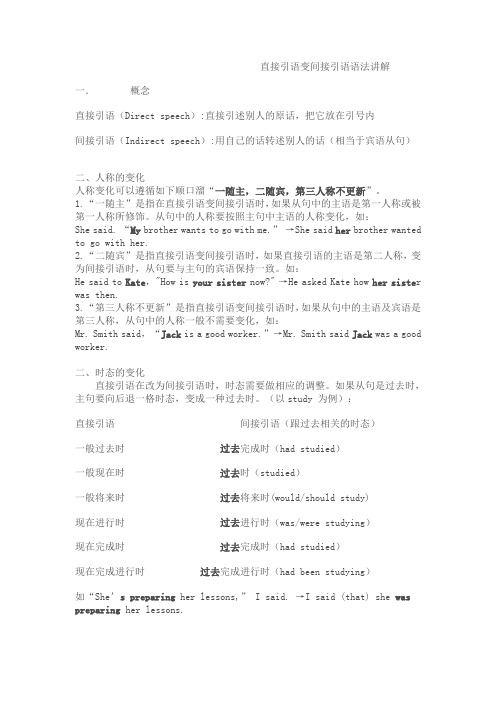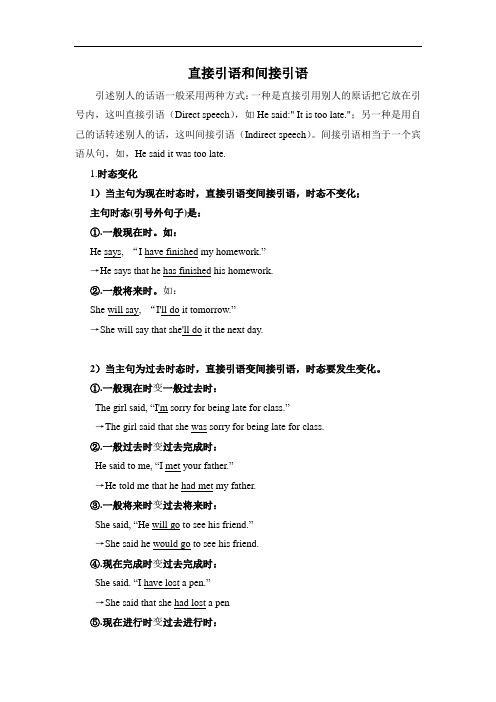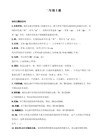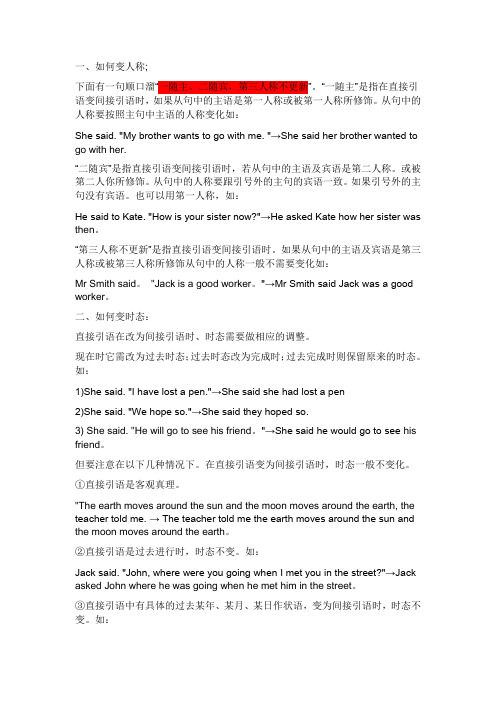最新全面归纳直接引语改间接引语
(详细版)直接引语变间接引语

4.直接引语是祈使句
间接引语应改为 “Tell (ask, order, beg等) sb (not) to do sth.”句型 。
"Don't make any noise," the teacher said to the studen →She told (ordered) the students not to make any noise. “Open the door, please," said she. →She asked him to open the door. The teacher said to the students, “Stop talking.” →The teacher told the students to stop talking. “Don’t touch anything.” He said. →He told us not to touch anything.
指示代词this, Nhomakorabeathese
时 间 状 语
now, today this week yesterday last week four days ago the day before yesterday tomorrow next month
The day after tomorrow
地点状语
方向性动词
直接引语变间接引语面面观
一、如何变人称: 口诀:一随主。二随宾,第三人称不更新。 “一随主”是指在直接引语变间接引语时,如果从句中的主语 是第一人称或被第一人称所修饰。从句中的人称要按照主句中 主语的人称变化如: She said. "My brother wants to go shopping with me. ” →She said her brother wanted to go shopping with her. “二随宾”是指直接引语变间接引语时,若从句中的主语及宾语 是第二人称或被第二人称所修饰。从句中的人称要跟引号外的主 句的宾语一致。如果引号外的主句没有宾语。也可以用第一人称 ,如:
直接引语变间接引语

直接引语变间接引语语法讲解一.概念直接引语(Direct speech):直接引述别人的原话,把它放在引号内间接引语(Indirect speech):用自己的话转述别人的话(相当于宾语从句)二、人称的变化人称变化可以遵循如下顺口溜“一随主,二随宾,第三人称不更新”。
1.“一随主”是指在直接引语变间接引语时,如果从句中的主语是第一人称或被第一人称所修饰。
从句中的人称要按照主句中主语的人称变化,如:She said. “My brother wan ts to go with me.” →She said her brother wanted to go with her.2.“二随宾”是指直接引语变间接引语时,如果直接引语的主语是第二人称,变为间接引语时,从句要与主句的宾语保持一致。
如:He said to Kate,"How is your sister now?" →He asked Kate how her siste r was then.3.“第三人称不更新”是指直接引语变间接引语时,如果从句中的主语及宾语是第三人称,从句中的人称一般不需要变化,如:Mr. Smith said,“Jack is a good worker.”→Mr. Smith said Jack was a good worker.二、时态的变化直接引语在改为间接引语时,时态需要做相应的调整。
如果从句是过去时,主句要向后退一格时态,变成一种过去时。
(以study 为例):直接引语间接引语(跟过去相关的时态)一般过去时过去完成时(had studied)一般现在时过去时(studied)一般将来时过去将来时(would/should study)现在进行时过去进行时(was/were studying)现在完成时过去完成时(had studied)现在完成进行时过去完成进行时(had been studying)如“She’s preparing her lessons,” I said. →I said (that) she was preparing her lessons.I said to them, “He’ll get excite.” → I told them(that) he would get excited.但要注意在以下几种情况下。
直接引语变间接引语

直接引语和间接引语引述别人的话语一般采用两种方式:一种是直接引用别人的原话把它放在引号内,这叫直接引语(Direct speech),如He said:" It is too late.";另一种是用自己的话转述别人的话,这叫间接引语(Indirect speech)。
间接引语相当于一个宾语从句,如,He said it was too late.1.时态变化1)当主句为现在时态时,直接引语变间接引语,时态不变化;主句时态(引号外句子)是:①.一般现在时。
如:He says, “I have finished my homework.”→He says that he has finished his homework.②.一般将来时。
如:She will say, “I'll do it tomorrow.”→She will say that she'll do it the next day.2)当主句为过去时态时,直接引语变间接引语,时态要发生变化。
①.一般现在时变一般过去时:The girl said, “I'm sorry for being late for class.”→The girl said that she was sorry for being late for class.②.一般过去时变过去完成时:He said to me, “I met your father.”→He told me that he had met my father.③.一般将来时变过去将来时:She said, “He will go to see his friend.”→She said he would go to see his friend.④.现在完成时变过去完成时:She said. “I have lost a pen.”→She said that she had lost a pen⑤.现在进行时变过去进行时:She said to me, “I’m studyin g Japanese these days.”→She told me that she was studying Japanese those days.3)当主句是过去时态时,时态也有不需要变化的情况。
(完整版)直接引语改为间接引语

(完整版)直接引语改为间接引语直接引语改为间接引语基本方法及例句基本方法1、改标点①把“冒号”改成“逗号”②去掉“双引号”2、改人称(一般情况下)③把“我”改成“他”/“她”把“我们”改成“他们”/“她们”④把“他”/“她”改成“我”把“他们”/“她们”改成“我们”⑤把“你”改成“我”/“他”/“她”⑥把“你们”改成“我们”/“他们”/“她们”(根据说话的对象决定)3、检查句子,添加/减少/修改一两个词语,使句子意思通顺,表达合理举例说明这些句子分成三类:①××对我说……1、直接引语是直接引用别人的话,而间接引语则是转达别人说的话,因此,直接引语改为间接引语时,说话人即第一人称“我”要改为第三人称“他”或“她”。
如:张童对我说:“我一定要坚持长跑锻炼。
”改:张童告诉我,他一定要坚持长跑锻炼。
2、当转述内容涉及其他人称时的改法。
如:姐姐对我说:“你说得对,我就这样做。
”改:姐姐告诉我,我说得对,她就这样做。
上面的例句中涉及了第二人称,在改为转述句时就应改为第一人称。
还应注意,冒号和引号前的内容不变。
②我对××说……如:我对小王说:“你的成绩总是名列前茅,我要向你学习。
”改:我对小王说,他的成绩总是名列前茅,我要向他学习。
③××对××说……如:妈妈对爸爸说:“我明天要去开会。
”改:妈妈对爸爸说,她明天要去开会。
妈妈告诉爸爸,她明天要去开会。
直接引语和间接引语句子训练文章摘要:本文章的主要内容是关于直接引语和间接引语句子训练,欢迎您来阅读并提出宝贵意见!直接引语和间接引语(转述句和陈述句)1.直接引语是直接引用别人的话,而间接引语则是转达别人说的话,因此,直接引语改为间接引语时,说话人即第一人称“我”要改为第三人称“他”或“她”。
如:张童对我说:“我一定要坚持长跑锻炼。
”改:张童告诉我,他一定要坚持长跑锻炼。
2.当转述内容涉及其他人称时的改法。
直接引语变间接引语

直接引语在改为间接引语时、时态需要做相应的调整。
现在时它需改为过去时态;过去时态改为完成时;过去完成时则保留原来的时态。如:
1)She said. "I have lost a pen."→She said she had lost a pen
2)She said. "We hope so."→She said they hoped so.
26. "When does the train leave? "she asked me.
27. "Go to bed and don't get up till you are called, his mother ordered.
29. "Please explain why you're late, " the boss said .
(二) 在空白处填入适当词,使之与原句要求一致. (10分, 10分钟)
1. The boss asked John, "Where have you been? " (改成间接引语)
The boss asked John where ____ ____ ____.
2. Mary said that she had drawn a picture of the West Lake. (改为直接引语)
He said, "These books are mine." →He said those books were his.
四、如何变句型:
①直接引语如果是陈述句,间接引语应改为由that引导的宾语从句。如:She said, "Our bus will arrive in five minutes."→She said that their bus would arrive in five minutes.
英语直接引语变间接引语

一、如何变人称;下面有一句顺口溜“一随主。
二随宾,第三人称不更新”。
“一随主”是指在直接引语变间接引语时,如果从句中的主语是第一人称或被第一人称所修饰。
从句中的人称要按照主句中主语的人称变化如:She said. "My brother wants to go with me. "→She said her brother wanted to go with her.“二随宾”是指直接引语变间接引语时,若从句中的主语及宾语是第二人称。
或被第二人你所修饰。
从句中的人称要跟引号外的主句的宾语一致。
如果引号外的主句没有宾语。
也可以用第一人称,如:He said to Kate. "How is your sister now?"→He asked Kate how her sister was then。
“第三人称不更新”是指直接引语变间接引语时。
如果从句中的主语及宾语是第三人称或被第三人称所修饰从句中的人称一般不需要变化如:Mr Smith said。
"Jack is a good worker。
"→Mr Smith said Jack was a good worker。
二、如何变时态:直接引语在改为间接引语时、时态需要做相应的调整。
现在时它需改为过去时态;过去时态改为完成时;过去完成时则保留原来的时态。
如:1)She said. "I have lost a pen."→She said she had lost a pen2)She said. "We hope so."→She said they hoped so.3) She said. "He will go to see his friend。
"→She said he would go to see his friend。
归纳直接用语改间接用语
归纳直接用语改间接用语引述或转述别人的话称为“引语”。
直接引用别人的原话,两边用引号““标出,叫做直接引语;用自己的语言转述别人的话,不需要引号这叫做间接引语,实际上间接引语大都是宾语从句。
1、人称的转变1)直接引语中的第一人称,一般转换为第三人称,如:He said,“I am very sorry.”——>He said that he was very sorry.2)直接引语中的第二人称,如果原话是针对转述人说的,转换为第一人称,如:“You should b e more careful next time,” my father told me.——>My father told me that I should be more careful the next time. 3)直接引语中的第二人称,如果原话是针对第三人称说的,转换成第三人称。
如:She said to her son, “I'll check your homework tonight.”——>She said to her son that she would check his homework that night.4)人称的转换包括人称代词、物主代词和名词性物主代词等,如:He asked me, “Will you go to the station with me to meet a friend of mine this afternoon?” ——>2、时态的转换直接引语改为间接引语时,主句中的谓语动词如果是过去时,从句(即间接引语部分)的谓语动词在时态方面要作相应的变化,变成过去时范畴的各种时态(实际也是宾语从句的时态要求),变化如下:直接引语间接引语直接引语间接引语一般现在时一般过去时一般过去时过去完成时现在进行时过去进行时过去完成时过去完成时现在完成时过去完成时过去进行时过去进行时一般将来时过去将来时3、直接引语变成间接引语时,从句时态无须改变的情况1)当主句的谓语动词是一般现在时的时候,如:He always says, “I am tired out.” ——>He always says that he is tired out.2)当主句的谓语动词是将来时的时候,如:He will say, “I’ll try my best to help you.” ——>He will say that he will try his best to help me.3)当直接引语部分带有具体的过去时间状语时,如:He said, “I went to college in 1994.” ——>He told us that he went to college in 1994.4)当直接引语中有以when, while引导的从句,表示过去的时间时,如:He said,“When I was a child, I usually played football after school.”——>He said that when he was a child, he usually played football after school.5)当直接引语是客观真理或自然现象时,如:Our teacher said to us, “Light travels faster than sound.” ——>Our teacher told us that light travels faster than sound.6)当引语是谚语、格言时,如:He said,“Practice makes perfect.”——>He said that practice makes perfect.7)当直接引语中有情态动词should, would, could, had better, would rather, might, must, ought to, used to, need时,4、时间状语、地点状语及某些对比性的指示代词和动词变化1)时间状语:直接引语间接引语直接引语间接引语now then tomorrow the next(following)daytoday that day next week the next(following)week(month, year)yesterday the day before two days ago two days beforelast week (month, year)the week(month, year)before this week that week(month, year)2)指示代词:these 变成those3)地点状语:here变成thereShe said, “I won't come here any more.”——> She said that she wouldn’t go there any more..4)动词:come变成go,bring变成take 5、直接引语变成间接引语,句子结构的变化1)陈述句。
直接引语变间接引语口诀
直接引语变间接引语口诀一、当直接引语为陈述句,变成间接引语的“顺口溜”是:去掉引号加that,人称变化要灵活,时态向后退一步,状语变化按规则。
She said,“My brother doesn't want to go there.”→She said that her brother didn't want to go there.二、当直接引语为一般疑问句,变成间接引语的“顺口溜”是:去掉引号加if,陈述语序要记住,时态人称和状语,小心变化别马虎。
I asked her,“Do you study English here?”→I asked her if she studied English there.三、当直接引语是特殊疑问句,变成间接引语的“顺口溜”是:直接去引号,陈述莫忘掉,小心助动词,丢它最重要。
“What do you want?”he asked me. →He asked me what I wanted.四、当直接引语是祈使句,变成间接引语的“顺口溜”是:去掉引号要加to, ask,tell须记住,直引若是否定式,not加在to前部。
The teacher said to her mother,“Please give me the book.” →The teacher told her mother to give her the book.五、对于人称变化,要求学生们记住的“顺口溜”是:第一人称看主语,第二人称看宾语,宾语若是不存在,活用代词I,my,me。
He said to her,“Are you interested in English?”→He a sked her if she was interested in English.The teacher said,“Where have you been?”→The teacher asked me(us) where I(we) had been.六、时态对应表:直接引语时态间接引语时态一般现在时→ 一般过去时一般将来时→ 过去将来时现在进行时→ 过去进行时一般过去时→ 过去完成时现在完成时→ 过去完成时(过去完成时时态不变)情态动词也要变成相应的过去式:can could; may might; must must/had to一般疑问句whether/if 引导的宾语从句“Is this your umbrella, Mary?” asked John.John asked Mary if that was her umbrella.特殊疑问句wh-词引导的宾语从句“Mary, when will you return John asked Mary when she wouldme the book?” asked John return him the book主句动词为一般现在时或现在完成时从句动词时态不变She often says, “All men and women She often says that all men and womenar e equal under the law.”are equal under the law.主句动词为一般过去时一般现在时一般过去时“I know it,” he said.He said that he knew it现在进行时过去进行时“I’m making coffee for you all,” she said.She said she was making coffee for us all.现在完成时过去完成时“I have seen her before,” said he. He said he had seen her before.一般过去时过去完成时“I saw her last Monday,” he said.He said he had seen her the previous Monday过去完成时过去完成时“ Do you know Rick had been ill in bed.Jack asked if I knew Rick had been ill in bedfor many days till he died?” Jack asked for many days till he died一般将来时过去将来时He said: “We shall start tomorrow He said they would start the next day由直接引语转变为间接引语,下列情况时态不变:1. 不变的真理The teacher said to the students, “Water freezes when the temperature falls below 0℃.”→ The teacher told the students that water freezes when the temperature falls below 0℃.2. 经常的习惯:He said to the doctor, “I smoke two packs every day.”→ He told the doctor that he smokes two packs every day.3. 历史事件:The teacher said, “World War Ⅱended in 1945.”→ The teacher said that World War Ⅱ ended in 1945.4. 部分情态动词,如must, ought to, used to, had better等:She said to me: “You must hurry up.”→ She said that I must hurry up.练习题;1. Jack said to me, “You look worried today.”Jack told me that ___ worried ___.A. he looks…todayB. you look…todayC. we looked…that dayD. I looked…that day2. We said to her, “They’re walking through the street now.”We told her that ___ through the street ___.A. we were walking…thenB. you are walking…nowC .they were walking…then D. they walking…now3. Mr Black said, “I have walked a long way this week.”Mr Black said that __ a long way __.A. I had walked…last wee kB. he had walked…that weekC. I walked…last weekD. he has walked…this week4. The man thought, “I shall take it back tomorrow.”The man thought that __ take it back ____.A. I shall…tomorrowB. I shall…the next dayC. he should…tomo rrowD. he wo uld …the next day5. They said to us, “Are you afraid to leave this house ?”They asked us ____ afraid to leave _____ house.A. that were we…thisB. that we were…thatC. if were we …thisD. if we were…that6. Jane said, “What did he hear about a week ago?”Jane asked ____ about _____.A. that he heard…a week ag oB. what he had heard…the week beforeC. what he had herd… a week agoD. if he heard…the week ago7. She asked, “Whose house will he break into next time ?”She asked whose house ____ break into __A. will he…next timeB. would he…the next timeC. he would…the next timeD. he will…next time8. Jack said to her, “Where do you spend your holidays?”Jack asked her where ____ holidays.A. she spent herB. you spend yourC. she spend herD. you spent your9. Black asked me, “ Why haven’t you left here yet?”Black asked me why ____ yet.A. I hadn’t left thereB. I haven’t left hereC. hadn’t I left thereD. haven’t I lef t here10. The teacher asked her, “Does the sun rise in the east ?”The teacher asked her ___ the sun ___ in the east.A. if…riseB. if…risesC. whether…roseD. whether did …rise。
直接引语变间接引语的转换
直接引语变间接引语的转换直接引语变间接引语的转换:(⼀)如何变⼈称:⼝诀:⼀随主,⼆随宾,第三⼈称不更新。
“⼀随主”是指在直接引语变间接引语时,如果从句中的主语是第⼀⼈称或被第⼀⼈称所修饰。
从句中的⼈称要按照主句中主语的⼈称变化。
如:She said. “My brother wants to go with me. ”→She said her brother wanted to go with her.“⼆随宾”是指直接引语变间接引语时,若从句中的主语及宾语是第⼆⼈称。
或被第⼆⼈称所修饰。
从句中的⼈称要跟引号外的主句的宾语⼀致。
如果引号外的主句没有宾语。
也可以⽤第⼀⼈称。
如:He said to Kate.“How is your sister now?”→ He asked Kate how her sister was then.“第三⼈称不更新”是指直接引语变间接引语时。
如果从句中的主语及宾语是第三⼈称或被第三⼈称所修饰,从句中的⼈称⼀般不需要变化。
如:Mr. Smith said, “Jack is a good worker.”→ Mr. Smith said Jack was a good worke r.(⼆)时态的变化①如果引述动词为现在时态,间接引语的动词可以保持原来的时态。
He says, “I have been writing a novel.”------- He says that he has been writing a novel.He says:"that's all right."----- He says that's all right.②如果引述动词为过去时态,间接引语中的时间就要往后推,即现在时间推⾄过去时间,过去时间推⾄过去的过去,将来时间推⾄过去将来时间。
具体变化见下表:She said:"I am a student."------- She said (that) she was a student.(⼀般现在时变成⼀般过去时)She said:"He will go to see his friend"-----She said he would go to see his friend.(⼀般将来时变成过去将来时) Tom said:"I am going to play basketball tomorrow."The teacher said, “You are doing OK.”⽼师说:“你们⼲得很不错。
“直接引语”转“间接引语”的方法
“直接引语”转“间接引语”的方法把人物对话内容(直接引用)改为第三者转述(间接引用)的形式,方法是:把直接引用中的第一人称“我”,第二人称“你”改成第三人称“他”;把引号去掉,把冒号改为逗号;其他词语根据需要做适当改变。
在这项练习中,难点是人称的变换。
那么,人称变换有无规律可循呢?有什么规律呢?归纳起来,转述句中的人称变换主要有以下几种形式:1、×××说:“我……。
”如:鲁迅说:“我的信如果要发表,且有发表的地方,我可以同意。
”这种类型的句子,在转述时,只要把句中的第一人称“我”改成第三人称“他”,去掉引号,冒号改成逗号即可。
改成:鲁迅说,他的信如果要发表,且有发表的地方,他可以同意。
2、×××对×××说:“我……,你……。
”如:张明对王强说:“我今天中午要到商店去买东西,回去可能要迟一点,请你告诉我妈妈。
”这种类型的句子中出现了第一人称“我”,第二人称“你”等人称代词,分析句子,句中的“你”就是提示语(冒号前面的语句)的第二个人,即王强。
在转述中,把“我”改成“他”、“你”指王强,可去掉,改成:张明对王强说,他今天中午要到商店买东西,回去可能要迟一点,请告诉他妈妈。
3、×××对×××说:“我……,你……,他……。
”如:张老师对小明说:“我今天中午有事情,不能到公园去了,请你告诉张春,叫他不要等我了。
这样的句式中出现了“我”“你”“他”等人称代词,在转述中,如还是把“我”改成“他”,就和原句中的“他”混淆,产生误会,因而,原句中的“他”要改成张春(引号中的那个人名)。
改为:张老师对小明说,他今天中午有事情,不能到公园去了,请告诉张春,叫张春下午不要等他了。
亦可把语句稍作改动,改为:张老师对小明说,他今天中午有事情,不能到公园去了,请告诉张春,下午不要等他了。
- 1、下载文档前请自行甄别文档内容的完整性,平台不提供额外的编辑、内容补充、找答案等附加服务。
- 2、"仅部分预览"的文档,不可在线预览部分如存在完整性等问题,可反馈申请退款(可完整预览的文档不适用该条件!)。
- 3、如文档侵犯您的权益,请联系客服反馈,我们会尽快为您处理(人工客服工作时间:9:00-18:30)。
引语四点变化1时态变化
2如何变句型
3人称变化
4 注丿意
1、直接引语如果表示客观真理,变间接引语时,时态不变。
2、直接引语若有明确的表示时间的词语,变间接引语时,时态不变。
3、若直接引语中含有could, must, should 等情态动词,变间接引语时,时态不变。
4、直接引述别人的原话,叫直接引语。
5、用自己的话转述别人的话,叫间接引语
时态变化
:
如果直接引语中的情态动词没有过去时的形式(例:ought to,had better, used to ,must, need)和已经是过去时的形式时,(例:could, should, would, might )不再变。
2时间状语,地点状语,指示代词、动词
直接引语变为间接引语时,有些时间状语,地点状语,指示代词和动词也要作相应的变动。
注:直接引语转换成间接引语时的变化应视实际情况而定。
假如就在当天转述,today ,yesterday,tomorrow 等就不需改变;如果在当地转述,here也不必改为there,come 也不必改为go。
另外,直接引语中有具体的过去某年、某月、某日作状语,变为间接引语时,时态不变。
如何变句型
①直接引语如果是陈述句,间接引语应改为由that引导的宾语从句。
如:
She said, "Our bus will arrive in five minutes."
f She said that their bus would arrive in five minu tes.
②直接引语如果是反意疑问句、选择疑问句或一般疑问句,间接引语应改为由whether 或if引导的宾语从句•
如:
He said, "Ca n you swim, Joh n?"
f He asked Joh n if he could swim.
"You have fini shed the homework, have n ‘ t you?" my mother asked.
f My mother asked me whether I had fini shed the homework.
"Do you go to school by bus or by bike?"
f He asked me if I went to school by bus or by bike.
③直接引语如果是特殊问句,间接引语应该改为由疑问代词或疑问副词引导的宾语从句
(宾语从句必须用陈
述句语序)。
She asked me, "Whe n do they have their dinn er?"
f She asked me when they had their dinner.
④ 直接引语如果是祈使句,间接引语应改为
"tell (ask) sb (not) to do sth."句型。
"Don ' t make any noise," she said to the children.
f She told (ordered) the childre n not to make any no ise.
"Bri ng me a cup of tea, please," said she.
f She asked him to br in
g her a cup of tea.
⑤ 直接引语如果是以 “Let 开头的祈使句,变为间接引语时,通常用 “suggest + 动名词 (或从句)。
”如:
He said, "Let ' s go to the film."
f He suggested goin
g to the film.
或 He suggested that they should go to see the film. ⑥ 直接引语是感叹句时,间接引语为
what 或how 引导,也可以用that 弓I 导。
She said, "What a lovely day it is !"
f She said what a lovely day it was . 或 She said that it was a lovely day.
⑦ 如果直接引语中含有 since, whe n, while 引导的表示过去时间的状语从句,在变为间 接引语时,只改变主句中的谓语动词,从句的一般过去时则不变。
如:
He said to me, "I have taught En glish since he came here ."
f He told me that he had taught English since he came here.
人称变化
注意 在以下几种情况下。
在直接引语变为间接引语时,时态一般不变化。
① 直接引语是客观真理。
② 直接引语如果是一般现在时。
表示一种反复出现或习惯性的动作,变间接引语,时态 不变。
如:
He said, "I at six。
"f He said
at s ix
遵从一主二宾三不变
一主:从句的第一人称随主句的主语变化
eg : “I have bought an expensive car , an expe nsive car.
二宾:从句的第二人称随主句的宾语变化 eg:
I often tell him , "You are luckiest boy I the luckiest boy I have ever see n .
三不变:从句的第三人称不需要变化。
said the boss.
have ever see n .
f The boss said he
f I ofte n tell him he is
bought
③当直接引语表示为名人名言或谚语时,时态不变.
④若直接引语为客观真理,时态不变,常考的有:Light travels faster tha n sound. 光速比声速快
The earth goes around the sun. 地球绕着太阳转
The moon goes around the earth. 月球绕着地球转。
